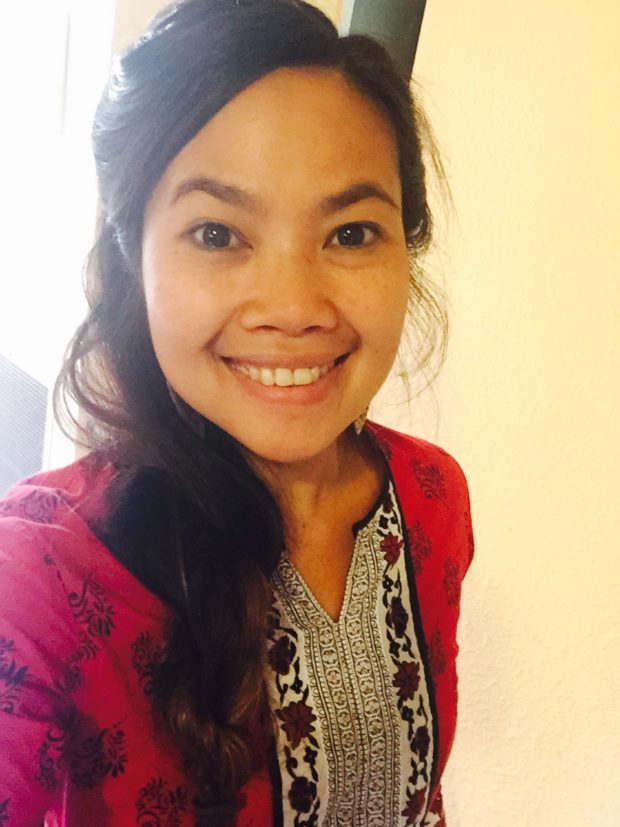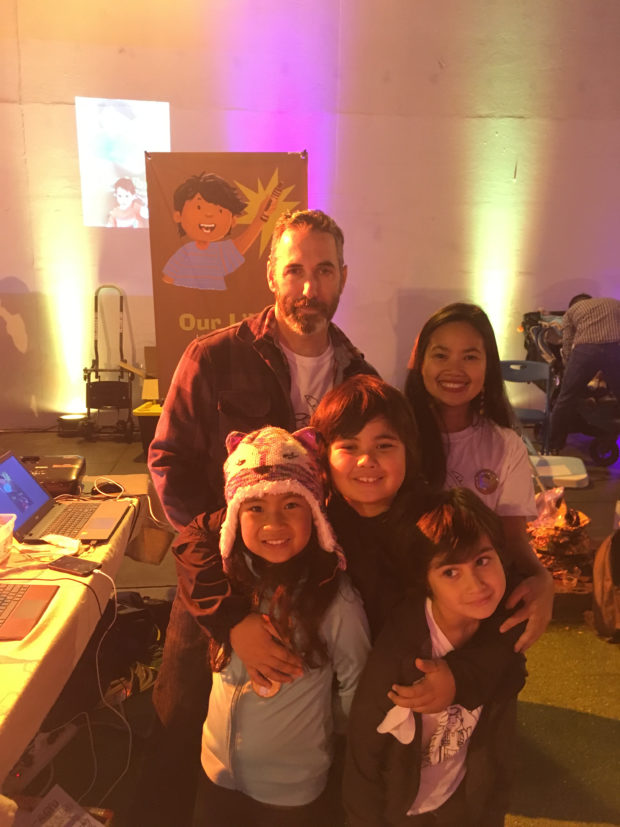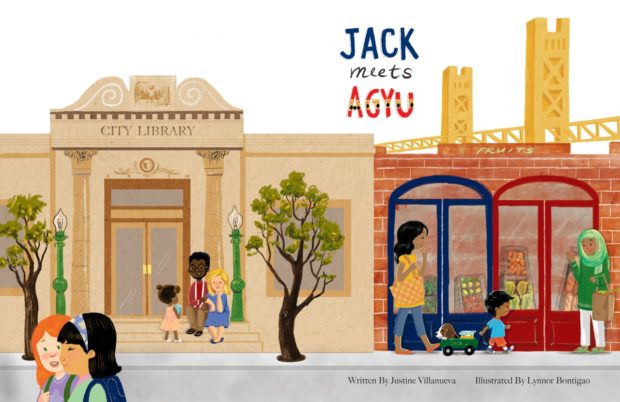Book publisher brings her ginikanan to America

Sagawa River Press publisher Justine Eva Li Villanueva. CONTRIBUTED
There once was a little girl named Justine Eva Li Villanueva. She grew up along the basin of Sawaga River. With its bounty, the river has given life to the people since time immemorial. It is the place where people gather for various reasons – a rendezvous for young lovers, a refuge after a hard day’s work, a place for fiesta, and a lot more.
Despite the river’s grace and bounty, people have come and gone. At 16, Justine and her siblings crossed the vast ocean to reach the other side of the world to follow her parents who were searching for the American Dream in a gray, cold and foggy place called Daly City.
Why is it always foggy in Daly? “Daly is the Pinoy Capital of the United States. Many Filipinos cooked rice throughout the day and the steam from the rice cooker fogs up the city the whole day,” Justine repeats a popular joke.
Justine in America
Just before emigrating, Justine was accepted at the University of the Philippines. In America she could have taken the General Education Development certificate, which is equivalent to a high school diploma, but her parents decided that she should enroll for a year in high school.
“I became a high-schooler again and got to experience the joys and miseries of being a high school student in America,” Justine recalls.
Like most immigrants, Justine didn’t escape discrimination, because she is female, young-looking, and brown.
“In college, for example, when I ran and became vice president of the student body, the adviser rolled her eyes and openly said she didn’t think I knew what I was doing. I didn’t, it was true, but her ridicule wasn’t helpful,” Justine lamented.

OurLibro Launch at Undiscovered SF on October 20, 2018. CONTRIBUTED
Justine has a degree in drama from San Francisco State University and in law from Golden Gate University in San Francisco. She is presently practicing law and teaching dance.
Justine’s adventures have not ended. They’re just beginning. She got married and moved several times until she found a home in Davis, California with her husband and two young sons, Charlie and Jack,.
Sawaga River flows
All these years, Justine has been keeping Sawaga in her heart, as a part of her ginikanan, her origin. To keep the river flowing, Justine began speaking Bisaya to her kids, but this was not enough. She wanted her kids to learn more about their origins; but books about Asia-Pacific where Fil-Ams came form are nearly nonexistent.
“In 2017, out of approximately 3,500 children’s books published in the US, only 300 or 8 percent were about “Asian Pacific” characters, while only 256 or 7 percent were by Asian Pacific authors and illustrators. Our Fil-Am kids very rarely get to see themselves in the books that they read,” Justine claims.
Justine says Filipino American children grow up either confused or unaware of their identities and how they belong in the American society because of the lack of stories that they can identify with. Despite the existence of over three million Filipino Americans, the publishing industry does not cater to them.
In 2014, Justine founded Sawaga Press, thepublishing arm of the non-profit Libro para sa Tanan, a literacy project Justine founded in 2008, to promote literacy in Malaybalay, Bukidnon.
“We at Sawaga River Press want to create books that tell our stories, especially those stories rooted in the indigenous cultures of our Filipino ancestors and in the indigenous values of the people in the land where Filipinos dwell (in the diaspora),” Justine explains.
Mama, Mama, Know What I Like? (Mama, Mama, Balo Ka Unsa Akong Ganahan?) was the first title of Sawaga River Press published in December 2016. It is a trilingual book in English, Bisaya and Filipino that tells of a day in the life of a five-year-old boy who goes on a picnic with his mom and younger brother.
Justine is no stranger to publishing. She was a marketing assistant at Jossey-Bass publishing in San Francisco. She also gives credit to publishing professionals, artists, business consultants, early childhood educators, independent small presses, and social activists who generously extended their expertise and creative talents that made the book possible.
‘Looks like me’
Justine reveals that all of the characters are based on real persons and their lived experiences.
“We write these stories and publish these books precisely so we can give voice and share with the world what our lives and experiences are like. We also want to be able to tell them on our own terms, and not just as footnotes or an aside to someone else’s stories.”
For the first time, the Fil-Am kids can have characters they can relate to, American as much as Filipino. The characters have brown skin and dark hair; with Kuya, Ate, Lolo and Lola who eat sinigangand champorado. They play Legos, climb trees or fight an imaginary Bakunawa (serpent like dragon in Philippine Mythology) in the bathtub.
“Once, while we were selling books at a fair, a Fil-Am boy came to look at our book and he said, “He looks just like me!” Moments like that bring tears to my eyes and remind me of why we’re doing this work,” Justine says.

The title page of Jack Meet Agyu. CONTRIBUTED
As a start-up, the publication of Mama, Mama relied mostly on crowdfunding and donations from the community and groups as well as volunteers to get administrative and creative work done.
A forthcoming book, Jack meets Agyu, will be released in the Spring of 2019.It is the story of a Fil-Am boy, who connects with Agyu, the cultural hero of Bukidnon. This is written in English, Binukid (language in Bukidnon), Bisaya-Cebuano, Filipino and Baybayin. Sawaga River Press collaborates with the Center for Babaylan Studies, Bulosan Center for Filipino Studies in UC Davis, and Balik sa Dagat Bangka Journey Project.
Reclaiming our indigenous selves
Sawaga River Press publishes its own books as an effort to decolonize and reclaim the indigenous selves.
“As a colonized people, many of us have forgotten or have not had the chance to learn our indigenous languages and along with them our creation myths, epics, legends, poetry, songs. Many of us think of the ways of our ancestors as backward, ‘uncivilized’ and embarrassing. Additionally, many of us, in our efforts to assimilate in the United States, have turned our backs on our Filipino identities,” Justine explains.
She adds: “We Filipinos belong where we are in the diaspora and we have the right to know about ourselves — our ancestors, our history, culture — and to love ourselves. Our books spread a message of belonging and self-love to children because we want them to know this when they’re still young, so that they grow up knowing and loving who they are. “
Sawaga books are in local Filipino bookstores like San Francisco’s Arkipelago Bookstore and Los Angeles’ Philippine Expressions Bookstore and can order at https://sawagariverpress.com/books/.

